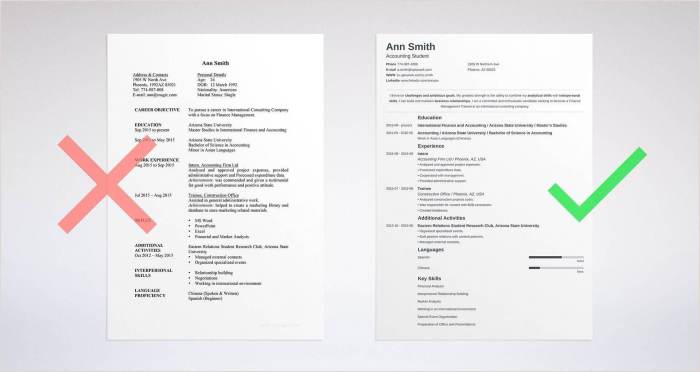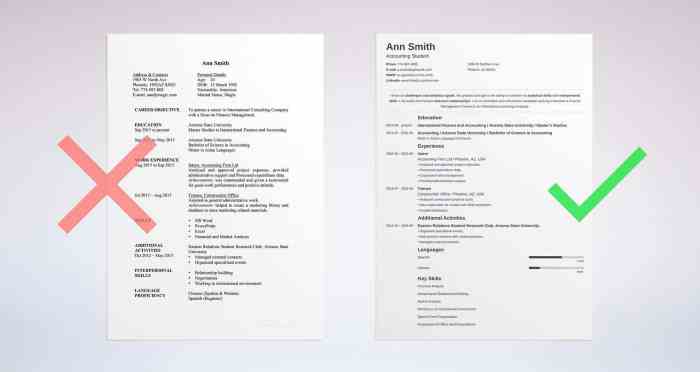Building a Strong Resume sets the foundation for a successful career journey, showcasing your skills and experiences in a compelling light. Let’s dive into the key elements that make a resume stand out in a sea of applicants.
Importance of a Strong Resume
Having a strong resume is crucial in the job application process as it serves as the first impression that potential employers have of a candidate. A well-crafted resume can make a candidate stand out among the competition and increase their chances of landing an interview opportunity. Here are some reasons why a strong resume is essential:
Stand Out to Potential Employers
- Highlighting relevant skills and experiences can capture the attention of recruiters and hiring managers.
- A polished resume showcases professionalism and attention to detail, reflecting positively on the candidate.
- An organized and visually appealing layout can make it easier for employers to quickly identify key qualifications.
More Interview Opportunities
- A strong resume increases the likelihood of getting noticed by applicant tracking systems (ATS) used by many companies.
- Employers are more likely to consider candidates with impressive resumes for further evaluation through interviews.
- Well-written resumes demonstrate a candidate’s commitment and dedication to their career, which can lead to more interview invitations.
Key Elements of a Strong Resume: Building A Strong Resume

When crafting a strong resume, certain key elements play a crucial role in showcasing your qualifications and experiences effectively.
Essential Components to Include:
- Personal Information: Include your name, contact information, and professional summary at the top of the resume.
- Work Experience: List relevant work experience in reverse chronological order, highlighting key accomplishments and responsibilities.
- Education: Detail your educational background, including degrees, certifications, and any relevant coursework.
- Skills: Showcase your skills, both technical and soft skills, that are relevant to the job you are applying for.
- Achievements: Highlight any notable achievements or awards that demonstrate your capabilities and success in previous roles.
The Importance of Tailoring Your Resume:
It is essential to tailor your resume to each job application to highlight the most relevant skills and experiences that align with the job requirements.
Effective Showcase of Skills, Experiences, and Achievements:
Utilize bullet points to clearly Artikel your accomplishments and responsibilities in previous roles. Quantify your achievements with numbers and data whenever possible to provide concrete evidence of your impact.
Formatting and Design Tips
When it comes to organizing and formatting your resume, it’s crucial to make it easy to read and visually appealing. Recruiters often spend only a few seconds scanning a resume, so you want to make sure yours stands out. Here are some tips to help you do just that.
Use of Bullet Points, Headings, and White Space
- Utilize bullet points to list your accomplishments and skills in a concise and easy-to-read format.
- Use headings to break up different sections of your resume, such as experience, education, and skills.
- Incorporate white space to create a clean and organized look, making it easier for recruiters to navigate your resume.
Choosing an Appropriate Resume Template and Font Style
- Opt for a clean and professional resume template that complements the industry you’re applying to.
- Stick to a simple and easy-to-read font style, such as Arial or Calibri, in a size between 10 and 12 points.
- Avoid using fancy fonts or excessive formatting that can make your resume difficult to read.
Tailoring Your Resume for Different Industries

When it comes to landing your dream job, customizing your resume for different industries is key. Employers want to see how your skills and experiences align with the specific job requirements, so it’s important to tailor your resume accordingly.
Highlighting Relevant Skills and Experiences
- Read the job description carefully to understand the key skills and experiences required for the role.
- Identify your own relevant skills and experiences that match those needed for the job.
- Highlight these skills and experiences prominently in your resume, such as in the summary section or under each job description.
Adapting Your Resume to Different Career Paths, Building a Strong Resume
- Consider the transferable skills you possess that are applicable across different industries.
- Showcase these transferable skills in a way that demonstrates their value in the new industry you are targeting.
- Use industry-specific s and terminology to tailor your resume to the specific field you are interested in.
